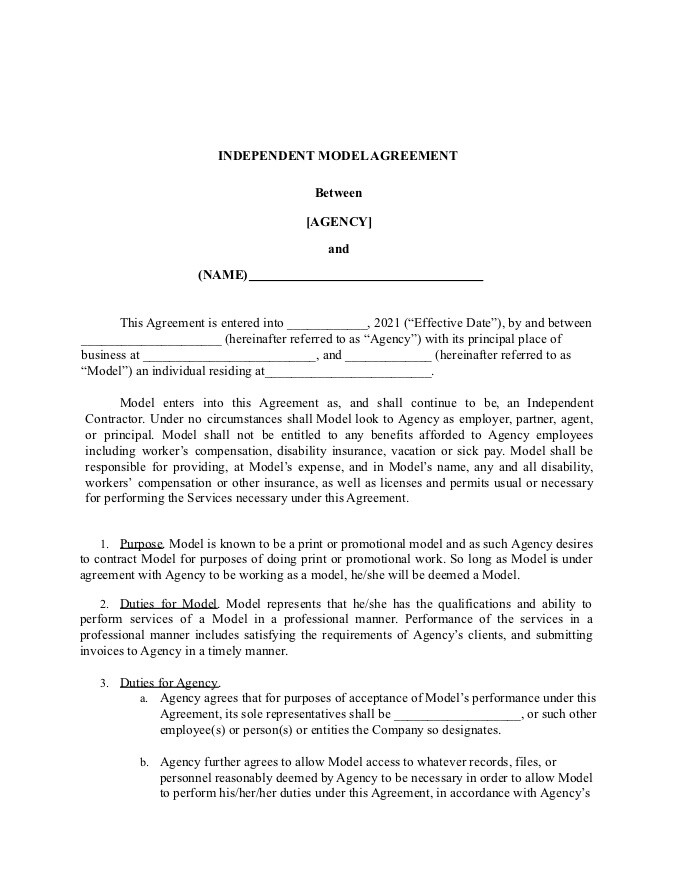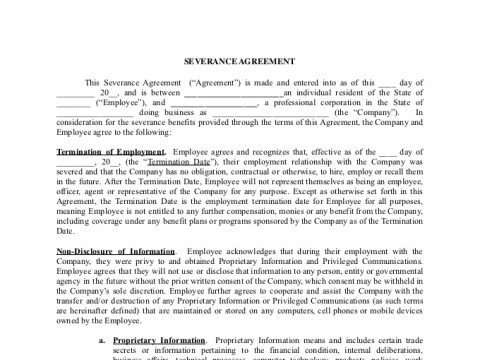What You Need to Know When Using a Modeling Contract Template
Looking for a customizable modeling contract template template to use for your business with clients? We’ve got a template ready to be customized for your needs today.
Download Template
Agency representation is a huge goal for today's aspiring models. With representation comes the opportunity to sign a modeling contract. This provides a huge step forward in a promising career — but it's also essential for ensuring long-term protection on both a personal and professional level.
On the agency's end, ironclad contracts ensure that models follow through with their clients. It also protects agencies from the improper disclosure of protected information.
Both models and their agents often struggle to understand modeling contracts. This confusion stems, in part, from the sheer variety of terms and conditions built into these contracts. Finding insight can also be tough given agencies' common desire to keep contract information private. To help, we explain what, exactly, a modeling contract template should include — and which errors should be avoided.
Which Clauses Should a Modeling Contract Template Include?
Modeling contracts — and the templates used to create them — may look significantly different for each agency. In general, however, models and agencies should expect to see clauses outlining these essentials:
- The model's duties. Which services will the model mentioned in the contract provide? This section should explain, at minimum, the need for the model to satisfy client requirements and submit invoices.
- Exclusivity. Language in some contracts calls for models to be exclusively represented by the agency in question. In other cases, models are free to work with other agencies. Exclusivity requirements are most commonly seen in editorial modeling contracts. Most commercial models enjoy more leeway to take on additional contracts as their schedules permit.
- Conflict of interest. Even if models are allowed to work with other agencies, contracts may mandate that they only accept work that is compatible with the agency represented in the agreement.
- Confidentiality. Many modeling contracts include confidentiality clauses, which protect agencies against the disclosure of proprietary information. In other contracts, models may agree to sign separate confidentiality agreements.
- Fees and taxes. From fee designation to invoice submission, this portion of the contract should outline exactly how payment will be handled. This should also include details about taxes, which, as independent contractors, models will be required to pay.
- Ownership of materials. This clause outlines how the rights of ownership will be designated regarding any products in which models are involved. This should also include the need for written authorization before models make use of the final product.
- Termination. Every modeling contract should discuss what will happen if either the model or the agency chooses to terminate the agreement. This clause should mention situations that might cause the contract to be concluded (such as material breaches on the model's end or the bankruptcy of the agency). It should also explain how pay will be handled in the event of the contract's termination.
Mistakes to Avoid When Using a Modeling Contract Template
While a modeling contract template can provide an excellent start, it's important to follow through by conducting plenty of outside research — and asking for clarification, when necessary. Be sure to avoid these common mistakes:
- Agreeing to anything on a verbal basis. In modeling, there should be no such thing as a handshake agreement. All terms must be included in the official written contract. This protects both the model and agency in case any verbal agreements are forgotten or neglected.
- Not taking extra measures to keep contracts secure. Both models and agents often sign contracts electronically. This approach is obviously more convenient than the paper-based contracts of yesteryear, but it can prompt significant risks if digital processes aren't developed with security in mind. Nitro Sign provides enhanced security throughout the entire eSign process.
- Not paying attention to exclusivity and confidentiality terms. Every portion of a modeling contract warrants careful consideration, but the exclusivity and confidentiality sections are particularly important. These can have a huge impact on how and where models work. They also shape recruitment efforts among agencies. Double-check these sections before agreeing to anything.
A detailed contract can protect both models and the agencies they serve. A modeling contract template provides peace of mind for all parties involved, so look to Nitro Sign for security every step of the way.


